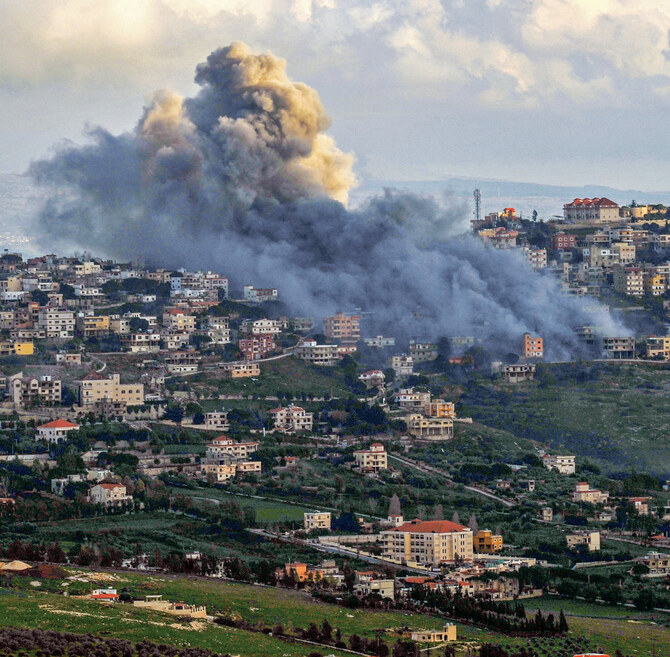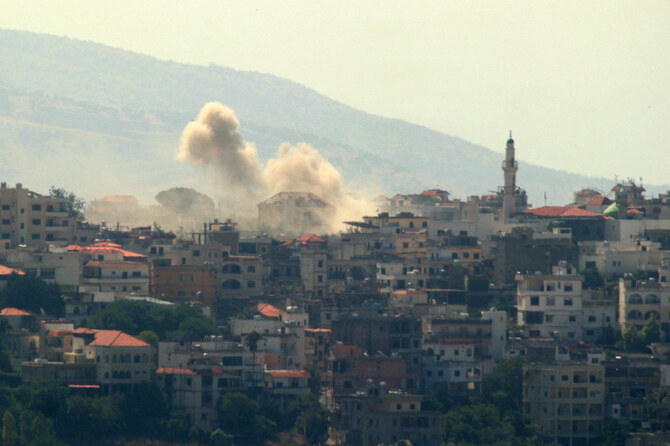BEIRUT: After weeks of tension, residents of Beirut’s southern suburbs as well as towns and villages in south Lebanon have resumed semi-normal routines, yet they remain cautious, keeping evacuation kits at their doorsteps.
Since Hezbollah’s retaliation for the killing of a senior military commander and close associate of its leader, Hassan Nasrallah, residents feared that Israel might exploit the situation to launch a devastating assault on the Iran-backed Shiite Lebanese group.
Hezbollah’s muted response, coupled with Israeli indications that it did not want a full-scale war, has brought some relief to residents of south Lebanon. Yet many of them consider the reprieve merely temporary and the risk of a future conflict as high, in the absence of an agreement to calm the border front with Israel and a ceasefire in the Gaza Strip.
Hezbollah and Israel each claimed victory on Aug. 25, when the former lobbed hundreds of missiles and drones at the latter to avenge the elimination of Fuad Shukr on July 30.
Hezbollah launched its assault in two stages — first with 340 rockets aimed at Israeli intelligence and military bases, then with drones targeting the Glilot base near Tel Aviv. Israel claimed it pre-emptively thwarted the attacks, destroying 90 percent of the Hezbollah rockets in the process.

The short confrontation on that day was regarded as mutually satisfactory, allowing a return to “business as usual” and rules of engagement in place since Oct. 8, 2023.
“From the start, Hezbollah has declared it doesn’t want war, but it is ready to confront any Israeli aggression,” a source close to Hezbollah told Arab News, adding that the group’s aim is to protect Lebanese civilians.
Analysts and experts have a somewhat different opinion. Some believe that a strong American military presence in the region played a role in deterring further escalation. The UN Security Council’s unanimous vote to extend UNIFIL’s mandate by another year was viewed by politicians, including caretaker Prime Minister Najib Mikati, as a sign that Lebanon’s stability is an international priority.
Lebanon has been in a state of financial meltdown that started in October 2019. The crisis, believed to be the world’s worst since the mid-19th century, has created dire living conditions for its population.

In this photo taken on July 27, 2022, long lines form outside a bakery in north Lebanon's port city of Tripoli as a years-long economic crisis depleted state coffers. (AFP)
To make matters worse, political divisions have prevented the election of a new president and the adoption of economic reforms needed for Lebanon to qualify for international loans. Analysts say the last thing the country can afford now is a bigger war.
Yet questions linger. Can Security Council Resolution 1701, which ended the 2006 war between Israel and Hezbollah, prevent future conflicts, despite the limitations that have become evident over the past 11 months?
“The southern front has returned to traditional patterns of confrontation,” Ali Fadlallah, a Lebanese expert in international relations, told Arab News. “Israel’s claim of pre-empting Hezbollah’s attack was false. Hezbollah’s drones reached their targets. Israel’s quick declaration of the end of its military operation suggested that Hezbollah’s response had acted as a deterrent.”
Nevertheless, he acknowledges that cross-border tensions are high, although they have eased slightly. “I expect this situation to continue until the US elections in November,” he said.

Israeli soldiers evacuate an injured man following a cross-border attack by Hezbollah fighters from Lebanon on September 1, 2024. (REUTERS)
Israel has solid reasons to avoid a full-scale war with Hezbollah, at least for now. Its soldiers have been fighting on two fronts since the Hamas-led attack of Oct. 7, without being able to destroy the Palestinian militant group and secure the release of scores of Israelis still held captive in Gaza.
Since Oct. 8, the Israeli military has also failed to push Hezbollah fighters at least 10 to 12 kilometers from its border to allow the safe return of 80,000 displaced people to northern Israel.
Against this backdrop, Israel’s demand for a ceasefire, rather than a cessation of hostilities as called for in Resolution 1701, is seen as reflecting a continuing view of southern Lebanon as an active front.

Citing repeated Israeli breaches of Lebanon’s airspace and sovereignty, as well as territorial disputes along the border claimed by Lebanon, Fadlallah said Resolution 1701 was flawed from the beginning since UNIFIL forces were stationed only on Lebanese soil.
Still, he said, “despite its flaws, 1701 remains the most accepted framework for maintaining stability.”
Resolution 1701 led to UNIFIL peacekeepers being deployed in southern Lebanon to monitor a ceasefire between Hezbollah and Israel. Yet provisions of the resolution remain unfulfilled, including full Lebanese sovereignty over border areas.
INNUMBERS
• 130-plus civilians killed in Lebanon since Hezbollah joined fight with Israel on Oct. 8, 2023.
• 110,000 Lebanese displaced from border villages by Hezbollah-Israel fighting.
• More than 90 percent of Syrian and Palestinian refugees in Lebanon live below the poverty line.
Robert Wood, the US ambassador to the UN, recently highlighted what he called continued efforts by Hezbollah to undermine the resolution, threatening both UNIFIL’s mandate and regional security.
“Resolution 1701 is the best hope for stability amid Hezbollah’s war of attrition,” Mehiedine Le Chehimi, an international law expert, told Arab News.
Disconnected from Lebanese state institutions, Hezbollah’s unilateral decisions have not protected the country from Israeli aggression or civilian displacement, he said

UNIFIL peacekeepers man a position near Khiam in southern Lebanon on August 23, 2024, as Israel and Hezbollah continue to exchange fire. (AFP)
At least 130 civilians have been killed in Lebanon since Hezbollah joined the fight with Israel as a “support front” on Oct. 8. According to Imran Riza, the UN humanitarian coordinator in Lebanon, more than 110,000 people have been displaced from the border villages and a further 150,000 remain within 10 kilometers of the UN-patrolled “Blue Line” in areas of south Lebanon.
Le Chehimi warned of a dead-end situation, with unregulated engagement and Hezbollah undermining state authority. “Resolution 1701 remains key to any solution, and the recent decision to extend UNIFIL’s mandate took on unusual importance due to the escalating situation,” he said.
Despite widespread breaches by Hezbollah and Israel, he believes Resolution 1701 still holds value even though it has failed to earn the full respect of either side
Opinion
This section contains relevant reference points, placed in (Opinion field)
Fares Souaid, a political analyst and former Lebanese MP, believes Hezbollah chief Nasrallah’s speech after Shukr’s elimination by Israel clarified a few things.
“Hezbollah proved that Israel cannot win a war without US support, just as Hezbollah and Hamas need Iran. With US-Iran indirect communication ongoing, we might see a temporary truce,” he said.
Souaid also pointed to Nasrallah’s announcement that Hezbollah had moved its arsenal north of the Litani River before Shukr’s killing, saying that it offered Israel a kind of security assurance.
Under the circumstances, Souaid believes a full-blown war is not imminent. Instead, he sees instead indirect negotiations between the US and Iran as a driving force in future developments

A portrait of slain Hezbollah military commander Fuad Shukr is displayed during a demonstration in the Lebanese coastal city of Sidon on August 2, 2024, to denounce his killing during an Israeli airstrike. (AFP)
Nevertheless, late on Friday the Israeli air force reportedly struck military structures and launchers allegedly belonging to Hezbollah in the Tayr Harfa area of south Lebanon. Warplanes also launched strikes at Maryamine and Yaroun in southern Lebanon while Hezbollah fired about 40 rockets into Israel that landed in the Upper Galilee.
“War could break out at any time,” said MP Bilal Abdullah of Lebanon’s Democratic Gathering political bloc, adding that the killings of Shukr in Beirut and Hamas political chief Ismail Haniyeh in Tehran were a hint that Israel might take more unilateral actions to reshape the region’s geopolitical landscape.
Abdullah said the unresolved Palestinian issue has been a source of instability since 1948. “The failure to grant Palestinians their natural rights fuels instability,” he said

Iranians take part in a funeral procession for late Hamas leader Ismail Haniyeh in Tehran, on August 1, 2024, ahead of his burial in Qatar. (AFP)
Despite an overall decrease in tensions along the southern border, Lebanon faces two stark possibilities: either reaching a significant agreement with international powers, or the postponement of an inevitable war, as Israeli Defense Minister Yoav Gallant has suggested.
Meanwhile, residents of border towns affected daily by Israeli shelling and airstrikes remain on edge, fearing further escalation. Recently, images circulated of trucks carrying goods from the southern border town of Mays Al-Jabal to safer areas, prompting worries about future displacement.
Some say these departures amount to a permanent move by local residents out of a war-prone area, but Hezbollah has rejected this theory. Activists of the group called the evacuation “a step to minimize losses” rather than an abandonment of border towns.
Whatever the truth, intense Western-led diplomatic efforts continue with a view to de-escalating the situation and preventing a major miscalculation.



















